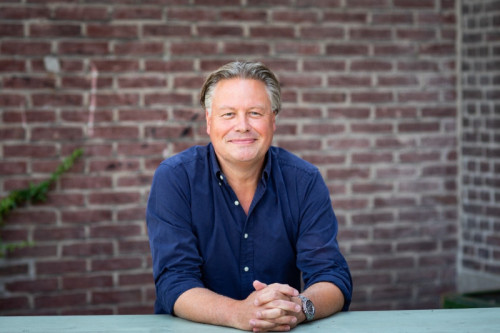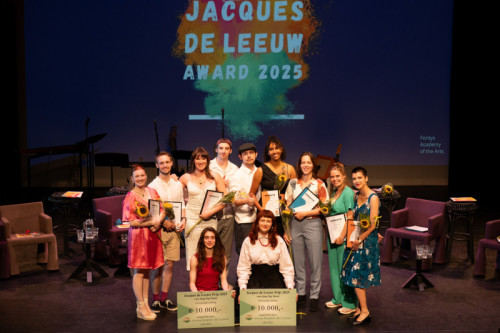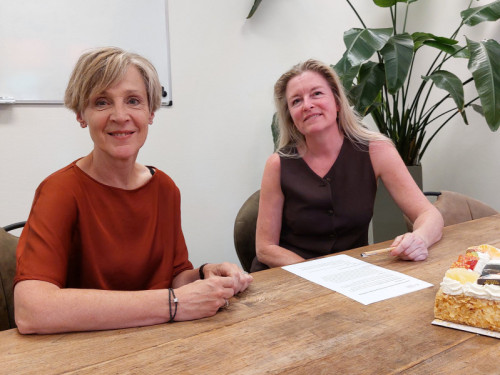What do you know about non-Western philosophy? Does the concept of monoculture mean anything to you? Do you believe that teaching can change society? Or should rather follow it? Can you connect music with visual arts or colours? To these and many other questions, the Fontys Arts Lecture series on cultural awareness might give you answers.
Throughout November and December, and already with a first look ahead to March 2023, you can attend free hybrid lectures, talks and workshops. They are open to all students, teachers, staff, alumni and also interested parties of Fontys Arts. Each activity starts at 19h00 and ends no later than 21h00. The language of communication is English. You can follow them at home (online) or at Fontys School of Fine and Performing Arts – Zwijsenplein, Tilburg (see the schedule for more details about the location/classrooms).
You can attend as many on- or offline lectures as you like. We do ask one thing: if you register, take part. Places are limited, it would be a shame to deprive others of the opportunity to participate. We would like to invest in you, so that through your active participation you can also co-invest in our broad learning community.
Registration is easy: view the offer, make a choice and register via this link. You will receive the correct login details (via Zoom) or location (Fontys School of Fine and Performing Arts) before the start of each lecture. You do not need a Fontys account, pass or complex software to participate.
_______________________________________________________________________________________________________________________________________________________
Outsiders – the (un)known thinkers from the philosophy of art Lectures by Thomas Crombez
November 10, 17, 24 and December 1 & 8 th 2022.
Looking at the story of Western aesthetics, one cannot but notice that it is today an increasingly problematic history, or at they very least a one-sided narrative. Almost without exception, its protagonists were all members of a white, affluent and male elite. That in itself is no reason to disregard their ideas. Except that we know absolutely nothing about what the other 99.9 percent of humanity thought about the art of their time. It has never been written down how tragedies and comedies were watched by Athenian women and children in ancient Greece. Or how the anonymous monk-artists of the Middle Ages felt about the strict distinction between practice and theory in medieval thought. Or how the illiterate workers of the eighteenth-century factories looked at the new relationship between nature and technology that so preoccupied the Romantic thinkers and poets. In the words of Israeli philosopher Yuval Noah Harari, ‘Very few people were concerned with “history”, while everyone else ploughed the fields and carried the water buckets.’
In this lecture series, I wish to highlight a number of thinkers who are either at the margins or even fully outside of Western philosophy of art. The authors under discussion include:
– Yuriko Saito (10/11/22);
– María Zambrano (17/11/22);
– Gilles Deleuze (24/11/22);
– Homi Bhaba & Sarat Maharaj (1/12/22);
– Aimé Césaire & Frantz Fanon (8/12/22).
You can attend these lectures as a series or as separate evening lectures. During the lectures, reference is sometimes made to earlier moments, but not in such a way that you cannot follow the lecture.
Thomas Crombez studied philosophy at the Free University of Brussels and Theatre Studies at the University of Antwerp. He received his PhD in Language and Literature from the University of Antwerp. He is the founder of www.letterwerk.be, a publishing house and design studio, publishing work on philosophy, art and society. He is also lecturer at FHK – Master Arts Education.
_______________________________________________________________________________________________________________________________________________________
A visual conversation with music Lecture/talk by Hawar Tawfiq
November 15th 2022
Hawar Tawfiq his music is often described as: “colorful”, “suggestive”, “meditative”, “alienating”, “an amalgamation of western and non-western music”, “sound painting with a virtuoso instrumentation”, “meditative and spiritual”, “full of energy in a colorful carpet full of lively sounds” and as “an extremely visual world of dialogues between the instruments”. It makes perfect sense when his music is connected to painting, color and visual arts. He grew up in a family where painting was important in daily life. The influence on his music of his elder brother Salar – one of the most influential painters in northern Iraq – is clearly noticeable. Hawar would like to speak about his career as a composer and about his music, and go into a dialogue with you.
Hawar Tawfiq is one of the most prolific Dutch composers of today. He has worked with several national and international ensembles and orchestras such as: Royal Concertgebouw Orchestra, Nederlands Philharmonisch Orkest, Het Gelders Orkest, Het Orkest van het Oosten, Philharmonie Zuidnederland and the BBC Symphony Orchestra.
_______________________________________________________________________________________________________________________________________________________
From Canonizing Cultural Institutions towards Commoning Art Constitutions Lecture by Pascal Gielen
November 29th 2022
Traditionally, art institutions and cultural infrastructures such as theaters, museums and libraries were built to support the values of the nation-state. Such institutions had the task, among other things, to simulate a uniform language and a monoculture for a population within a geopolitical space. From the 1970s onwards there has been strong criticism on this model to which the colonial and post-colonial criticism connects. A solution is then sought in a more multicultural approach where multiple cultures must be represented equally. However, multiculturalism is based on an identity policy that takes harmony and consensus to easily for granted. In his lecture, Gielen argues for another model that is based on so-called ‘commoning’ politics and dissent. It does not matter to smooth out or suppress conflicts and tensions, but to make them visible and ‘liveable’. Such a ‘commonist’ policy does not start from the equality between cultures, but focuses permanently on the ‘lesser’ in a society, on those who are not yet represented and do not have a voice independent of their cultural background, gender or social class. It does not focus on identities, but on the democratic free keeping and releasing of common necessary sources, such as education, language, culture, but also labor, health care and housing. Such resources are the subject of continuous struggle and discussion. Cultural institutions could be the ideal platforms for such a politics of dissensus.
Pascal Gielen is writer and full professor of sociology of culture and politics at the Antwerp Research Institute for the Arts (ARIA) where he leads the Culture Commons Quest Office (CCQO). Gielen is editor of the international book series Antennae – Arts in Society (Valiz). He has published many books on culture, politics, commons and civil action.
_______________________________________________________________________________________________________________________________________________________
Critical, Creative and Cultural Pedagogies Lecture/workshop by David Limaverde
December 6th 2022 – only offline
David Limaverde will explore references, approaches and turns in what we can call Critical, Creative and Cultural Pedagogies. He would like to talk about the art projects related to post/de/anti-colonial art practices that he is currently working on with Fossil Free Culture, as well as introducing a few global south American references.
David Limaverde is an Amsterdam-based, Brazilian-born art educator, participatory performance artist, and researcher. His interests are in art-activism, socially engaged performance, participatory art methodologies and transversal themes of collective authorship, collaboration, relational practices and civic participation. David has a background in Physical Theatre, holds an MA in International Performance Research from The University of Amsterdam, and a Ph.D. in Arts and Education from the Faculty of Fine Arts at the University of Barcelona. He is also lecturer at FHK – Master Performing Public Space.
_______________________________________________________________________________________________________________________________________________________
Towards a global perspective Workshop with Aminata Cairo
March 16th 2023 – only offline
Aminata Cairo engages people, communities and organizations to implement positive change and communicate the message that every story has value. In an open dialogue Aminata will invite participants to communicate towards a global perspective.
Born and raised in the Netherlands to Surinamese parents, she left for the US to pursue her college education. She obtained a dual Bachelor in Psychology and Physical Education, Master’s Degrees in Clinical Psychology and Medical Anthropology and a Ph.D. in Medical Anthropology. Her passion is to use her academic skills to positively impact communities. She has done extensive community work in the Netherlands, U.S., Suriname, and Ghana. She founded her own multi-cultural dance company Sabi Diri, so be it in Kentucky, with which she performed throughout the United States and as far as Suriname. As a university professor she committed herself to upholding her students and promoting their sense of commitment and responsibility to the larger community.
_______________________________________________________________________________________________________________________________________________________
The gestures of participatory art Lecture by Sruti Bala
March 23rd 2023
The gestures of participatory art insists that the concept of participation must be re-imagined and shifted onto other registers. Moving from reflections on institutional critique and impact to concrete analyses of moments of unsolicited, delicate participation and refusal, the lecture examines a range of artistic practices from India, Sudan, Guatemala and El Salvador, the Lebanon, the Netherlands and Germany. It proposes the concept of the gesture as a way of theorising participatory art, situating it between the visual and the performing arts, as both individual and collective, both internal attitude and social habitude.
Sruti Bala is Associate Professor at the Dept. of Theatre Studies of the University of Amsterdam, where she currently co-ordinates the MA Theatre Studies programme. She is affiliated to the Amsterdam School of Cultural Analysis and is a member of the ASCA advisory board. Sruti’s research interests are at the intersections of performance and politics, which has taken shape in specific research projects on nonviolent protest, participatory art, artistic activism, feminist and postcolonial/decolonial literary and cultural theories and translation.


